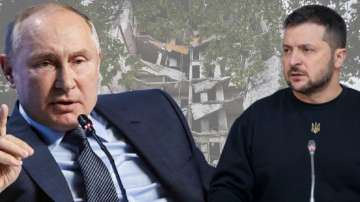Why Russia escalated atrocious war against Ukraine and will it end soon?
Year ender 2022: The year 2022 witnessed some of the most significant events that fetched major transitions around the globe. The changes were definitely the worst ever following the COVID-19 pandemic and World War II.

Year ender 2022: The year 2022 witnessed some of the most significant events that fetched major transitions around the globe. The changes were definitely the worst ever following the COVID-19 pandemic and World War II. The pandemic has already brought the world economy to a crawling state, but the new shifts in global order have brought them to the stage of collapse.
Since the beginning of this year, the two world powers-- Russia and Ukraine-- started amassing their soldiers near the border regions. Until February, global pundits opined that both countries would not engage in a full-fledged war, knowing the truth "if Russia escalates any kind of conflict, the West and Europe might come in support of Kyiv."
Although, the United States intelligence agency ascertained that Russian President Vladimir Putin would start the conflict following his return from Beijing Winter Olympics. However, Putin, on several occasions rejected the claims and added he had been moving the troops towards the border region in order to secure Russia from possible attacks from the North Atlantic Treaty Organization (NATO). Later, on February 24 this year, Putin announced a full-fledged war against Ukraine on February 24, resulting in the mass destruction of lives and properties in Kyiv.
How did it start?During the last month of 2021, there were reports that Ukraine might join the NATO alliance as a precautionary measure, knowing the truth Moscow had captured Crimea in 2014. On several international platforms, Putin warned actor-turned his Ukranian counterpart Volodymyr Zelenskyy to abandon his ambitions of joining the intergovernmental military alliance. Although it was not clear whether Zelenskyy spoke to Putin about his ambitions, the latter took it as an "opportunity" and amassed lakhs of its troops to attack its neighbouring nation.
Putin even accused the US and its allies of ignoring Russia’s demand to prevent Ukraine from joining NATO and offer Moscow security guarantees, and credulously claimed that Russia doesn't intend to occupy Ukraine but will move to “demilitarise” it and bring those who committed crimes to justice.
On an ill-fated day, February 24, after the initial explosions in Kyiv, people could be heard shouting in the streets. But then a sense of normality returned, with cars circulating and people walking in the streets as a pre-dawn commute appeared to be starting in relative calm. However, soon emergency sirens rang across the country, with sounds of explosions booming the civilian and government buildings. While on television screens, Putin was seen justifying, asserting the attack was needed to protect civilians in eastern Ukraine — a false claim the US had predicted he would make as a pretext for an invasion.
Sanctions and failed peace talksUS President Joe Biden and other world leaders condemned the raid and warned Russia of facing possible repercussions. Subsequently, the US and other EU nations imposed sanctions on Moscow, with an aim of penalising President Putin for his action against Ukraine. Later, more countries joined the move and nearly all major American, and German companies including-- Domino's Pizza, Audi, H&M, Ikea, Nestle, and hundreds of others-- left Moscow. Barely a few days after the escalation of the brutal war, both countries sit for peace talks at least four times. But, that too failed.
Bucha killings
In April, the world witnessed one of the most horrific episodes of the war, wherein more than 400 bodies were found in Bucha and Irwin. This drew massive global criticism, wherein countries' blamed the Russian army for the war crimes in Ukraine. However, this did not let down Putin's aggression against his neighbouring country and continued to blow several regions of the already war-torn nation.
In September, the EU imposed a ban on several energy resources including coal and crude oil. This resulted in a major blow to the Russian economy as it is majorly dependent on energy trade. Earlier this month, the EU set an oil price cap for crude oil and petroleum oils and oils obtained from bituminous minerals which originate in or are exported from Russia, at USD 60 per barrel. According to the Commission, the price cap on Russian oil will limit price surges driven by extraordinary market conditions and drastically reduce the revenues Russia has earned from oil after it unleashed its illegal war of aggression against Ukraine. It will also serve to stabilise global energy prices while mitigating adverse consequences on energy supply to third countries.
More than 6,700 Ukranians killedAs of December 11, 2022, the Office of the United Nations High Commissioner for Human Rights (OHCHR) verified a total of 6,755 civilian deaths during the ongoing war. Of them, 424 were children. Furthermore, 10,607 people were reported to have been injured. However, OHCHR specified that the real numbers could be higher.
The way aheadDecember marked eight months of the brutal war, with cities witnessing major attacks and energy crises. As of now, the West and the EU have imposed maximum pressure on Moscow to end the war, but Putin, on the other hand, exhibited he would continue with his plans. Although Ukranian forces are giving tough replies to the Russian forces ever since the war escalated in February, the upcoming chilling winter would be difficult for both Zelenskyy's forces and his citizens amid a severe crisis of heating gas. Some experts have even claimed the upcoming winter would decide the fate of the war, but the current situation does not forecast any possibility of ending the conflict.